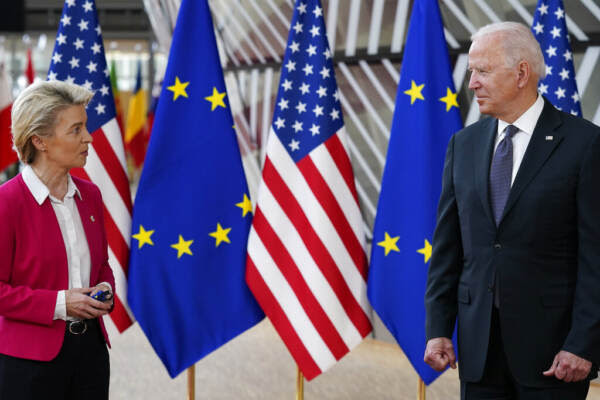No American President ever travels to Europe without a bag full of so-called “deliverables” and US President Joe Biden duly arrived in Brussels on March 24-25 for NATO and EU Summits with a long list of new sanctions and related economic measures. These new US sanctions, however, were unlikely to have a major new impact on Russia’s economy because they were for the most part an expansion and deepening of similar sanctions announced in the first weeks after the Russian invasion of Ukraine began.
For the Biden trip, the US announced on March 24 that it was “designating” (asset freezes and transaction/travel bans) what it called “key enablers” of the invasion. This included dozens of Russian defense companies, 328 members of the Russian State Duma, and the head of Russia’s largest financial institution. The full list here: U.S. Treasury Sanctions Russia’s Defense-Industrial Base, the Russian Duma and Its Members, and Sberbank CEO | U.S. Department of the Treasury
On March 31, the United States designated an additional 21 entities and 13 individuals primarily involved in sanctions evasion networks to procure western technology.
Reinforcing allied unity in the face of the Russian invasion was a critical trip objective for President Biden. Accordingly, showing the world how well the US and EU were coordinating sanctions and energy strategies was at the top of the agenda for all leaders involved. Seen from this perspective the Biden Brussels stop was only partially successful since no new EU sanctions emerged.
For its part in this show of allied unity, the EU focused on energy measures instead of invoking a new round of sanctions. Both the US and EU announced a “partnership” and the establishment of a high-profile taskforce on March 25 that would work to reduce the EU’s reliance on Russian fossil fuels, but a number of European countries, including Germany, continue to remain reluctant to announce drastic measures against Russia’s energy exports for fear of exacerbating existing supply disturbances which appear to be deepening. This so-called “joint game plan” will increase US LNG deliveries to the EU by 15 billion cubic meters (bcum) this year.
In addition, both sides agreed to remove regulatory hurdles to infrastructure improvements needed on both sides of the Atlantic to enable already-strained US exporters to “surge” LNG and other deliveries to the EU and reduce a significant part of the bloc’s Russian energy dependency, but clearly not to immediately replace the entire 41% of the bloc’s gas imports which originate from Russia.
The EU had agreed earlier this year to drastically shift its energy purchases away from Russia over the long term in response to the Ukraine invasion and purchasing more US-origin LNG was a major element of that strategy, along with expanding renewable energy production at home.
Ultimately, EU energy imports from Russia remain the biggest source of hard currency that is cushioning if not directly funding Moscow’s invasion of Ukraine, especially with the large percentage of foreign currency reserves Russia had held abroad currently frozen by sanctions.
Russia’s next possible default
Moscow denied President Biden perhaps his most important Brussels talking point by narrowly averting default on March 17 by making the required coupon payments in dollars on $117 million in maturing debt. However, the next challenge for Moscow is rapidly approaching with $2.2 billion coming due on April 4. None of this debt may be paid in rubles, according to observers who have seen these contracts (note: some contracts do allow small ruble payments).

Russia’s Finance Ministry has taken two interesting steps this week. Initially, it issued a note on March 28 saying full repayment of the maturing debt would be made in dollars. Then on March 29, it tendered an offer to all foreign investors to repay their foreign currency-denominated bonds in rubles at the March 31 exchange rate. It is not known how many investors accepted this offer. There are other indications that Russia could be preparing to make the scheduled payment, the most important being that paying agents and clearinghouse banks continue to make small payments on other debt instruments as they came due this week.
Creditors remain divided on whether the payment will be made for several reasons. First, of course, is the size of the payment which is more than ten times the March 17 payment amount. The second issue is technical feasibility. The Treasury Department’s Office of Foreign Assets Control (OFAC) clarified in early March that such debt repayments will be allowed using funds OFAC has frozen, but only until May 25. Thus, the April 4 payment, if ultimately not made, is more of a political signal to demonstrate Russian defiance (behavior not uncommon under other sanctions programs) than a true economic stress data point.
Only after the May 25 deadline, designed to give financial markets time to cushion in the event of a default, can we begin to postulate that Russia is having problems generating sufficient hard currency to service its debt through transactions with non-sanctioned countries.
On a related note, S&P Global this week cut Russia’s credit rating to “CC,” which is defined as “default imminent with little prospect for recovery.” Four years ago, the agency awarded Russia an investment-grade “BBB-” rating.
The default question is a separate issue from the ongoing tussle over whether Russia will cease accepting payment for its EU energy sales in dollars or euros and demand rubles as payment. Both the EU and Russia have staked out hard-line positions, but a compromise mechanism is likely in the works whereby the energy buyers transmit their normal hard currency payments which Russia then coverts to rubles internally.
-------------------------------------------
By: Alec Mally
Title: Sanctions expand as Russia approaches major default
Sourced From: www.neweurope.eu/article/sanctions-expand-as-russia-approaches-major-default/
Published Date: Fri, 01 Apr 2022 17:19:36 +0000
Read More
 UK PoliticsWorld PoliticsVideosPrivacy PolicyTerms And Conditions
UK PoliticsWorld PoliticsVideosPrivacy PolicyTerms And Conditions
